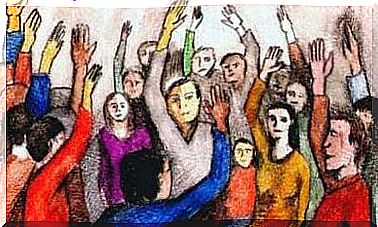Compassion Opens Our Hearts U0026 Makes Us Happier
Compassion is our ability to understand another person’s suffering and alleviate or reduce it. The concept is both simpler and more intense than empathy, because it invites us to want to help put an end to the suffering of another.
Compassion for oneself gives us the ability to be kinder to ourselves, especially when things are going badly. Learning to develop compassion is an ability that can help us feel happier and happier with our daily lives. Of course, as long as we do not abuse or drown ourselves in it.
Psychologist and researcher Paul Gilbert created a therapy that revolves around humanity. He points out that it is not just about feeling sorry for others. Instead, it is a motivation that gives us energy to help others, in a way that allows them to alleviate their suffering on their own with our help.
The word compassion means “suffering together” or “dealing with feelings of sympathy”. It is the feeling we get when we perceive suffering in others, which makes us want to reduce it. This feeling is divided into different components:
- A cognitive component that includes the attention and evaluation of the suffering of others, as well as the recognition of our own capacity to act when faced with this.
- A behavioral component that includes compromises for each person involved and the firm decision to stage actions that help eliminate the suffering.
- An emotional component that motivates us to act according to the gut feeling, which generates emotional reactions that give us a sense of personal satisfaction. Our level of psychological well-being depends to some extent on the type of relationship we have formed with others.
This feeling helps us to connect with our heart to put ourselves in the shoes of others. It opens a door to emotions, which makes us feel as if we are going through the experiences of people around us. We know what hurts them, and it makes us suffer too.
Compassion helps us to stop looking down at the ground and begin to see what is going on around us. It reminds us that we are not alone in this world, that others are also important. Furthermore, we will have a tremendous sense of inner peace if help is honest.
Being compassionate for us closer to others and gives us the chance to do our best to help others, with humility and closeness. Every time we care about someone who needs it, we enlarge our own heart by offering sincere help.
Why do we not take more advantage of this phenomenon when we have so many chances to do so? We do not give ourselves the chance to act with human because getting focus is not in the right place. Social neuroscience has shown that our natural impulse is to help.
We are ready to offer help immediately. So why do we not sometimes help?
Feelings of compassion can make us feel afraid to act for different reasons. Here are some examples:
- We worry that by helping others we will put ourselves in a situation of vulnerability, where others may repel us.
- Observing the suffering of others makes us feel sad that we do not want to feel.
- Compassion leads us to relive unhealed wounds from childhood, which prevents us from creating a connection to the suffering of others.
- We worry that we will not be able to overcome another person’s suffering once we have created a bond to it.
- We want to focus our attention on other things that we perceive as “more important”.
Compassion for ourselves is built by realizing our inner suffering, being able to understand its meaning and allowing us to accept and treat ourselves with affection. It’s a way of cultivating a loving attitude towards ourselves, especially when things are not going as planned.
Compassion invites us to look at society as a force for transformation, which takes the inner to the outer. Instead of filling ourselves with self-criticism and judgment, compassion allows us to be kind-hearted and build a loving adult within us. An adult who takes care of and protects us every day.
Instead of creating distance from humanity, suffering unites us, thanks to humanity.
If we perceive the suffering of others and exercise compassion for ourselves, it is necessary to practice the way we view suffering. All we need to do is notice that we are not alone, that there are always others who need help. We must not look away.
This suggests that when we come in contact with suffering, we may feel overwhelmed by our emotions. This is our second task, to learn to deal with the emotions that are born within us when we act with humanity as a guide.
Perceive suffering
Perceiving one’s own suffering and the suffering of others is the first step to feeling compassion. To do that, we need to open our hearts so that we can get in touch with our emotions.
For example, if we are on the street and see that someone is suffering, we should stop for a while to fully perceive suffering, instead of passing by as if it were not our problem.
Evaluate the suffering of others
It is important to practice these skills without judging, because otherwise we will not be able to feel compassion. Nor will it seem as if we have completed the previous step. For example, if we believe that the person deserves to suffer, compassion will not appear.
Experience the feeling completely
To open ourselves to the feeling is to let ourselves feel it completely, as well as other emotions that come with it. Even if it causes us some suffering or discomfort. If we allow ourselves to be swept away by humanity, we will be able to reach a deep sense of kindness.
For example, if we watch something on the news that affects us, we should allow ourselves to cry, without blocking the emotions. In this way, we will feel free to experience compassion.
Take action
When we perceive the suffering of others, evaluate the greatness of it and feel it without censorship, we must act. We can not just keep this feeling within us. For example, we can start working to reduce the suffering of a friend or family member.
Give the person the emotional support he so desperately needs.
There are many positive effects for society and ourselves. For the Dalai Lama, the power of humanity has the ability to:
- Encourage the type of education that focuses on empathy, ethics and personal development.
- Create new economic systems that are more fair to society.
- Realize that we are a single human race, where there is no separation between them / us or superior / inferior.
- Develop dialogue and communication instead of violence.
- Reduce social injustice by allowing more transparency in all areas.
- Put an end to cultural differences, in addition to prejudice and corruption.
If we include humanity in our lives, we will notice significant changes. We can try to imagine someone close to us suffering, and see what effects this has on our body.
Send this person feelings of kindness and compassion to see how different you feel. Then send good feelings to someone who does not like you as much, and see how you feel.
Mindfulness helps us develop the ability to transmit this to others. To become human, we must create a mental space, as if it were our private room for counseling. Here we can perceive the suffering of others and take action.
This is how we will start building a more just and generous world, and everyone must pull their weight.
Changing society begins with treating each other better, including ourselves. To exercise empathy and compassion for others. There are no excuses not to start today. The sooner we begin to experience this, the greater will be the happiness and well-being we feel in our daily lives.







